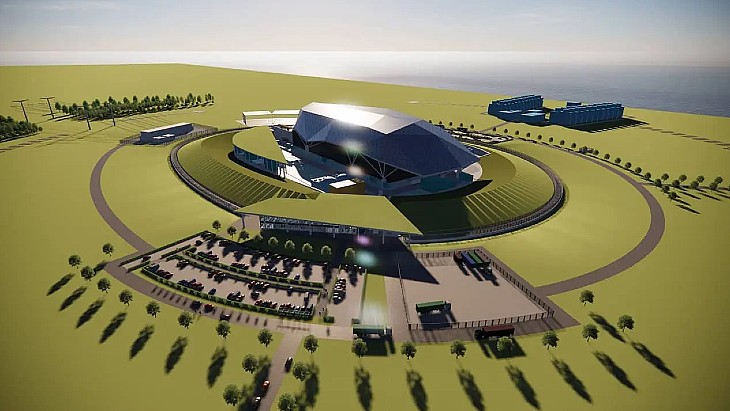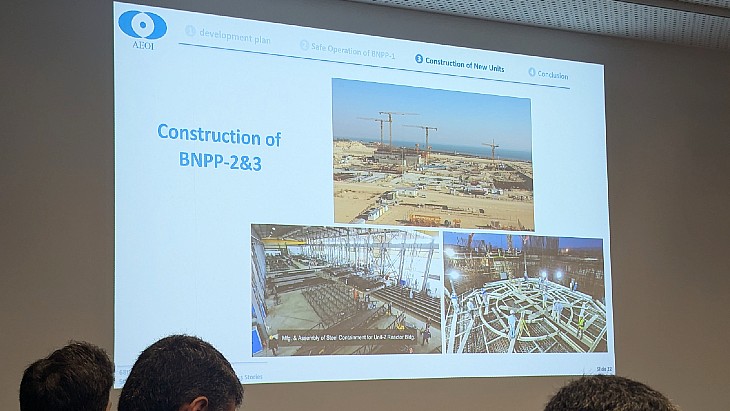AtomStroyExport unveils schedule for China projects
.JPG)
ASE and China National Nuclear Corporation (CNNC) signed the general contract for the construction of Tianwan 7 and 8 and a technical contract for two new units at Xudabao on 7 March. These contracts were prepared in accordance with the strategic package of agreements signed during a visit by Russian President Vladimir Putin to China last June. This package defines cooperation between Russia and China in the nuclear industry in the coming decades. Contracts for Tianwan 7 and 8 were signed between CNNC and Rosatom in early November marking the implementation of the framework contracts.
ASE is the engineering division of Rosatom and Bannik’s comments appeared in an interview with the state nuclear corporation’s newspaper, Strana Rosatom, yesterday.
"According to the contract, first concrete will be poured at Tianwan-7 in May 2021; five months later at Xudabao-3; another five months later at Tianwan-8; and another five months after that Xudabao-4," Bannik said. "That is, there will be a 10-month gap between units 7 and 8 at Tianwan, and a five-month gap between the seventh unit at Tianwan and the third unit at Xudabao, which is a new site for us. The target dates are very ambitious and meeting them will require clear and coordinated work by all the project participants."
The construction site of Tianwan 7 and 8 is "essentially ready", Bannik said. "Now we are working on levelling it out, but we already know this area because we’ve built four units there and so we don’t need to conduct any additional surveys," he added. The Chinese side has fully prepared the Xudabao site for the construction of six blocks, two of which ASE will build, he said.
Bannik said: "We are planning the nuclear island, issuing the technical requirements and monitoring the plant as a whole, as well as the safety concept and preparing documents for licensing. The Chinese side is responsible for designing the non-nuclear island part and supplying all the equipment for it. We will supply the main equipment of the nuclear island and some security systems. The Russians will participate in all stages of construction."
He added: "There are many specialists in the company - they are our old friends who worked on the construction of the Tianwan units, which we are very pleased with. The division of labour at the new units is no different to that at Tianwan-3 and -4, for which the Chinese side has fully taken over the construction work. Therefore, we don't plan to bring our own resources to the extent that we need to at sites in other countries. But, perhaps, we will need specialists to work in the representative offices and on-site to oversee the construction and installation work by the Chinese side."
ASE plans to boost the number of personnel working on its China projects, he said, "but not by much".
"In the management company, we want to keep the number of the Chinese directorate at an optimal level. The projects for the units are similar and it is necessary to take advantage of this, and not to over-inflate it. As for representation in China, the sites are located too far from each other, in different provinces. For Xudabao, we’ll have to create a structure, almost repeating the representation in Lianyungang, at the construction site of the Tianwan NPP. That is a requirement of the contract," Bannik said.
The VVER-1200 projects in China will differ slightly to units of the same design built in Russia, he said, owing to different soil, climate and water supply features. In addition, the Chinese customer has a number of specific requirements related to nuclear, radiation and fire safety, and environmental impact, he added without elaborating.
Novovoronezh II-2 will be the third VVER-1200 to be commissioned, following Novovoronezh II-1 and Leningrad II-1, which were launched in 2016 and 2017, respectively.
Rosatom describes the VVER-1200 as a Generation III+ power unit, which has a number of economic and safety advantages when compared to the previous generation (VVER-1000). It is 20% more powerful; requires 30-40% fewer operator personnel; and its operating period is twice as long, at 60 years, with the possibility of extension by an additional 20 years.
Rosatom also has VVER-1200 construction projects in Bangladesh, Belarus, Finland and Hungary.
_92619.jpg)

_84504.jpg)






_88592.jpg)
_66488.jpg)

